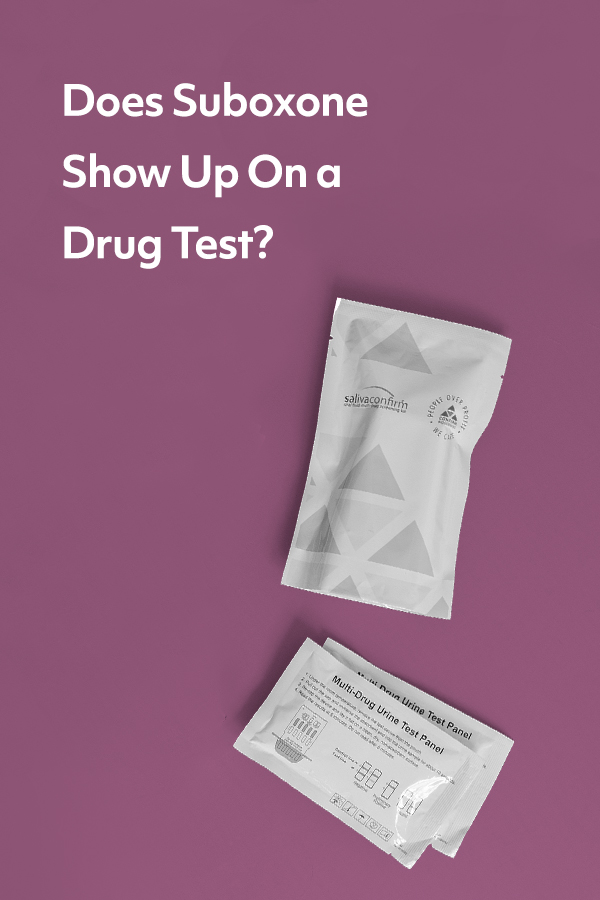When you’re taking a medication like Suboxone for addiction recovery, taking a drug test for employment or other reasons can bring up a lot of worries.
Q: Will Suboxone show up on an opioid drug test?
No, buprenorphine, the opioid ingredient in Suboxone, will not show up in an opioid drug test. Most opioid panels test for two specific metabolites: morphine, and 6-acetylmorphine, the latter of which is unique to heroin. Buprenorphine is a synthetic opioid, not an opiate, and does not metabolize as morphine, so will not show up on a general opiate or opioid panel. The catch? Some drug tests are designed specifically to detect buprenorphine. Usually, these tests have 12 or more panels, meaning they are testing for multiple substances. If you’re taking one of these, then of course you can test positive for buprenorphine.
Even then, if you are being prescribed Suboxone or another formulation of buprenorphine, you shouldn’t have to worry about a positive result. In most cases, it is illegal to discriminate against a patient for taking a prescribed medication so long as you were honest about your prescription from the start.
Read more: Is Suboxone an opioid? and other questions answered.
Q: What drugs are tested for in a drug test given by employers?
Employers can order different drug tests but they commonly test for the following substances: tetrahydrocannabinol (the psychoactive ingredient in marijuana), cocaine, opioids, methamphetamine, amphetamines (e.g. speed, Adderall, and Ritalin), barbiturates (e.g. phenobarbital), and benzodiazepines (e.g. Xanax, Valium, Ativan). They also may test for other drugs such as alcohol, quaalude, PCP and MDMA.
Read more: Opioid addiction at work: ‘My resume doesn’t show my addiction.’
Q: Why do I have to drug test during Suboxone treatment?
The reason we drug test as part of your Suboxone treatment is for your benefit, so your clinician can provide the treatment you need. We need to make sure that you are using your medication and not diverting it to other people (which is illegal as well as impacts how effective your treatment can be). We also occasionally test for other illicit drugs, such as cocaine, that you may also wish to change your relationship with and that can affect your health. At Workit Health, our program is based in harm reduction, so you won’t be kicked out of our program based on a positive drug test for other substances.
Read more: 4 major barriers to Suboxone treatment and how to overcome them.
Q: How is fraudulent drug testing prevented?
Urine drug tests typically test for drug metabolites, not the drug itself, which can only be produced by taking the medication and letting the body process it. For instance, some buprenorphine tests also test for the metabolite norbuprenorphine. This means that dissolving a Suboxone film in a urine sample won’t fool the test because the metabolite will not be present.
If you take a drug test in person, health professionals who conduct drug tests are trained to look for evidence of tampering of urine samples such as unusual colors, smells, cloudiness, or a soapy appearance. They may also use heat-sensitive strips (urine should be 90-100 degrees Fahrenheit within 4 minutes of production) to detect whether or not a sample is fresh. Urine drug tests conducted in a laboratory will also often test for normal human metabolites found in urine, such as creatinine, as a means of measuring whether the test has been diluted with water. An issue that can arise from this is that not everyone has the same levels of creatinine in their system; vegetarians and vegans may have lower levels than the general population, and sometimes regular hydration can cause a test to appear to have been artificially diluted when it was not. It’s a good idea to avoid drinking excessive fluid before a urine test, if possible. Blood, sweat, and hair can also be used to test for drugs and are much harder to tamper with than urine.
In reality, if you feel the need to trick a provider regarding your drug test results, they may not be the best provider for you or the treatment plan you’re on may not be right for you. If you use a substance in a way that is other than that which you desire, or if you use a substance you don’t wish to continue using, you should feel safe having that conversation with your provider, whether or not it shows up on your drug test.
Q: What foods/drugs may interfere with my drug tests?
False positives are fairly common in instant urinalysis tests, but can usually be detected as false in confirmatory tests (the tests that are conducted in a lab). Many common medications and certain foods can cause false positives, such as cold medicines and antihistamines. Here is a good list of many of the foods and medications that can cause false positives.
One particular food to take note of while in a program for opioid addiction are poppy seeds. Even the amount of poppy seeds found on a bagel can be enough to trigger a positive if eaten on the same day as the test—and it will not show up as a false positive in a confirmatory test. That’s because, technically, it’s not a false positive. Poppy seeds actually do metabolize in the body as an opiate alkaloid. It’s not anywhere near enough to cause a palpable effect, but it can still be enough to trigger a drug test positive. The U.S. government recognized this issue and raised the detection threshold (meaning the levels of morphine that will trigger a positive) for military personnel and other government officials, but many non-government tests remain sensitive enough to detect the small amount of morphine in poppy seeds. Because poppy seed positives are harder to disprove than false positives from other medications, it’s a good idea to skip that poppy seed muffin the day of your drug test.
If you’re being drug tested for marijuana, it’s also worth being aware that, while it is extremely unlikely that non-psychoactive cannabis products like CBD will trigger a positive, it’s technically in the realm of possibility, especially if you consume the products very frequently. If you don’t live in a state where marijuana is legal, these products are supposed to be hemp-derived, which means they must contain .3% of THC (the main active ingredient in marijuana) or less, but depending on the manufacturing process, they may contain more. Some manufacturers intentionally add more THC to their CBD products, especially if you’re purchasing them from a legal recreational store.
If you end up testing positive for a substance you have not taken, ask for your sample to be confirmed in a lab. It may also be a good idea to let your provider know in advance if you are taking a medication you know can trigger a false positive.
Q: If I do test positive for Suboxone or another substance on a drug test, what can I do?
Whether you’re getting drug tested for employment or for a drug treatment program, be honest about your use when confronted with a result. If you are prescribed a medication, offer to bring in a doctor’s note explaining your treatment. If you are being tested for a job, consider informing your employer upfront about your medication prior to taking the drug test. Although it is a violation of federal law to fire you because you are taking prescribed buprenorphine, an employer can technically fire you for “dishonesty,” which they can claim if you didn’t disclose your medication before you tested positive. If you’d prefer not to disclose your medication because you are worried about stigma, ask what substances are being tested for in advance. Buprenorphine will not show up unless specifically tested for.
Q: Do employers test for Suboxone?
Federal employers do not test for buprenorphine, but private employers are free to test for any substance they wish. While most will not test for it—it’s an extra cost with little purpose—they are legally allowed to. If your employer gets a positive drug test result, the laboratory should ask whether there were any medications taken that may have caused the positive outcome. This will allow you to clarify that you are taking a prescription medication as directed.
Q: What does BUP stand for on a drug test?
BUP stands for buprenorphine, which is used for treating opioid use disorder.
If you are taking buprenorphine without a prescription, consider speaking with an affordable, harm reduction-oriented provider like WorkIt Health to get legal access to this medication and reduce the harms associated with black market buys. It’s much safer to get your prescription from a clinician who knows your medical history and is attentive to your wellness, and to get your medication from a pharmacy that has strict safety protocols.
Q: Will Suboxone show up on a 10-panel drug test?
No, despite being a partial agonist opioid, Suboxone does not show up on panels as other opioids. A 10-panel drug test accounts for expanded opiates including codeine, heroin, morphine, hydrocodone, and oxycodone.










